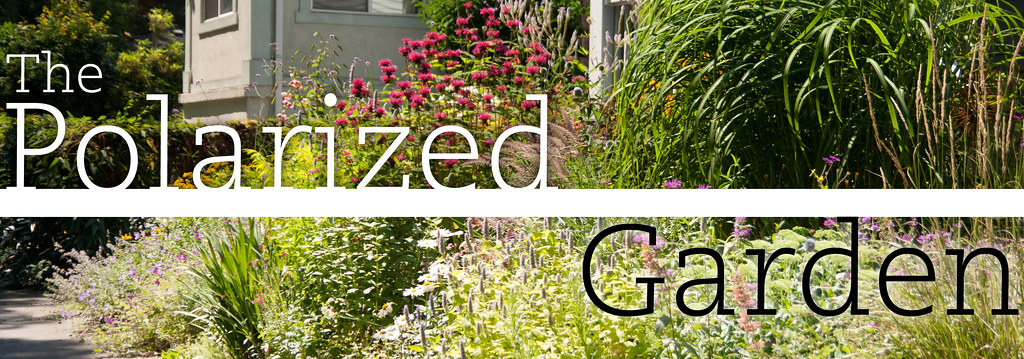
It's no secret that I like taking photos...although I was late to the game and didn't get my own real camera until a few years ago. Since then, I seldom leave the house without my camera...you just never know when something interesting will catch your eye. One question I get asked on occasion is what it takes to get good garden photos. Well, aside from the obvious, (shoot on overcast days, or during the famed "Golden Hour") my best piece of advice is to invest in a polarizing filter.
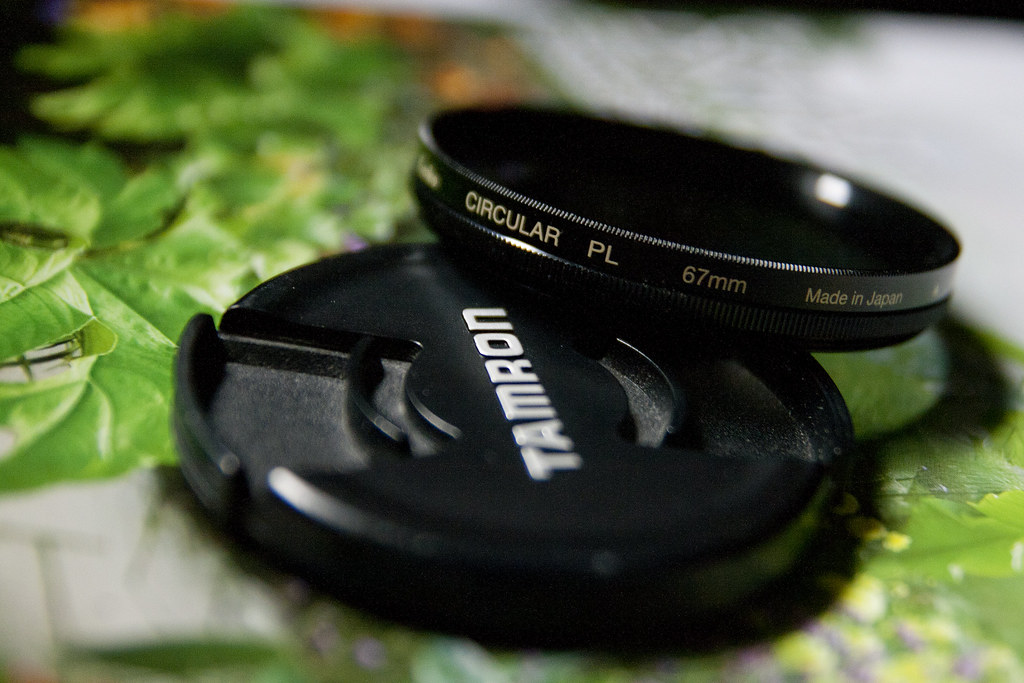
From Wikipedia:
A polarizing filter, used both in color and black-and-white photography, filters out light polarized perpendicularly to the axis of the filter. This has three applications in photography: it reduces reflections from some surfaces, it can darken the sky and it saturates the image more by eliminating unwanted reflections.
The short and simple of it, it reduces glare from reflected light, the benefit of which is more saturated colors and "cleaner" images. A polarizer is really useful for almost all outdoor photography...it darkens skies (how many times have you taken a photo with a totally blown-out white sky). Although for gardening shots, it's main benefit is to cut down on glare on leaves/flowers, it can also reduce the effect of atmospheric haze in wider, landscape-type shots.
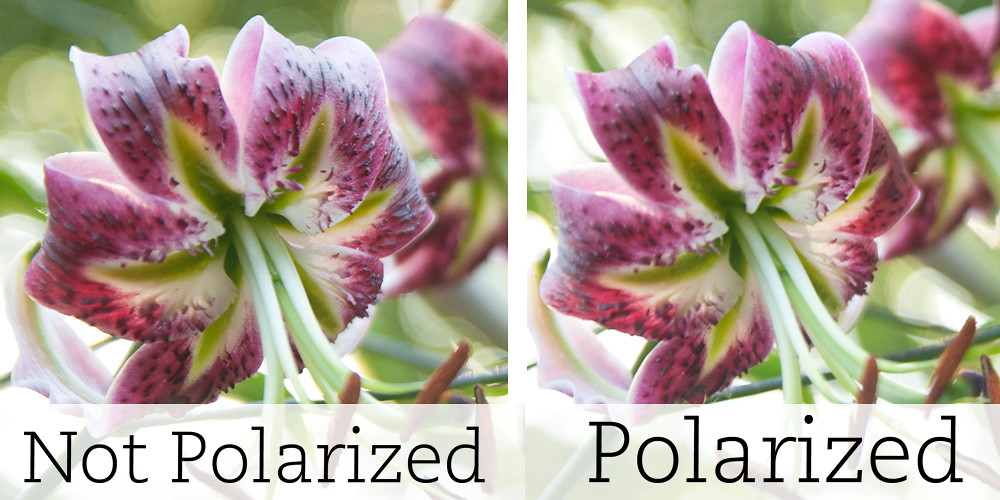
Here is an example of glare that would normally show up in a photo...you can see the polarized version has elimiated the white glare on the side of the petals facing toward the light source.
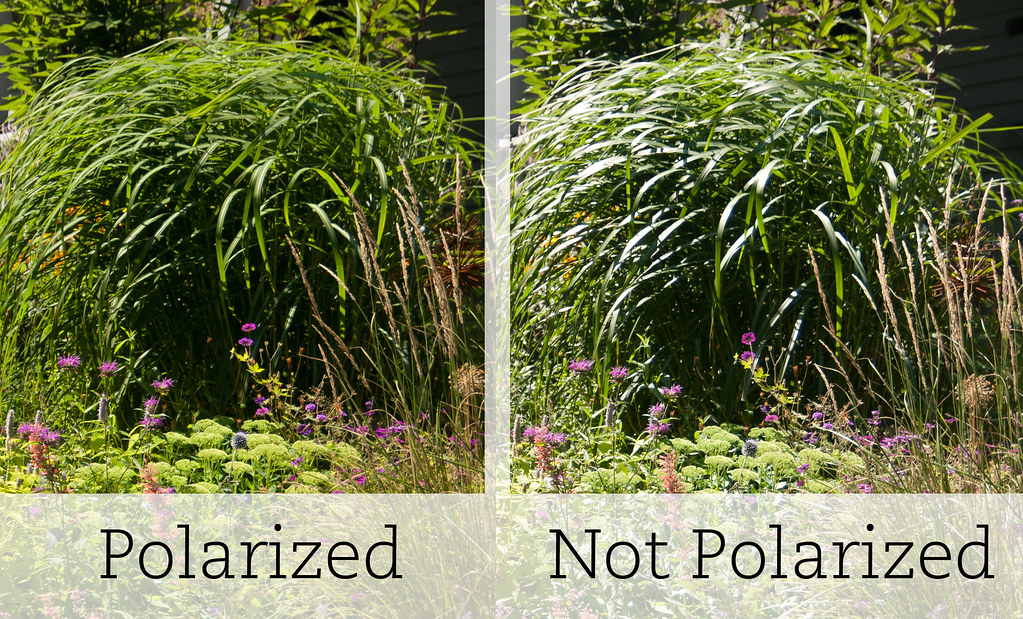
Another example, this time on Miscanthus. This is more dramatic than many examples, as the leaves of the grass are slightly more reflective anyway, and compounded with glare, get totally blown-out. With the polarizer, however, most of the glare is reduced enough to be able to actually see the grass, not just the glare!
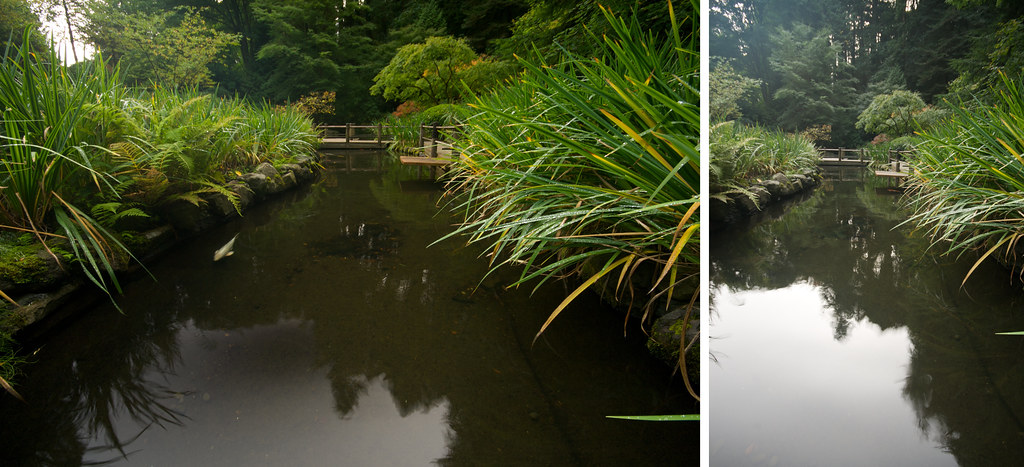
Another case where you can get extreme results is with water. These are some shots I took at the Portland Japanese Garden last year. The shot on the left shows the effect of the Polarizer, actually counteracting the glare on the pond, allowing you to see the fish underneath its surface! Notice on the un-polarized photo on the right shows how much the reflected light blocks your view of what's below the waters surface. Also, notice the fog/haze in the background...which is almost non-existant in the polarized version. You'll notice that one shot is vertical and one is horizontal...this demonstrates the difference in rotation of the filter. I rotated my camera after taking the horizontal shot and didn't rotate the filter accordingly, so that 90° rotation totally reversed the polarization.
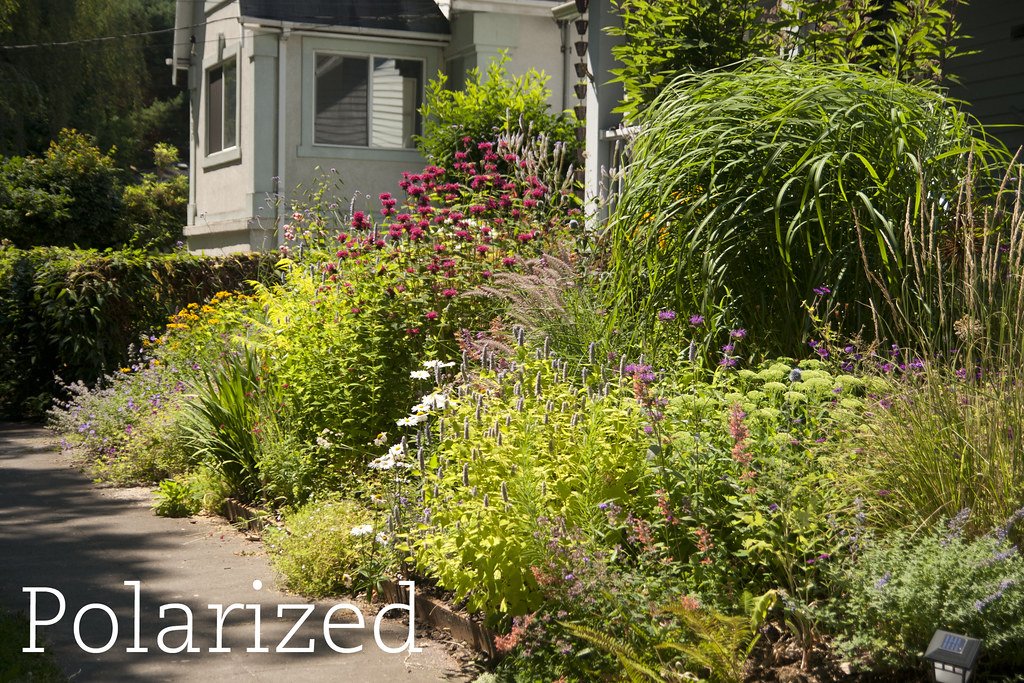
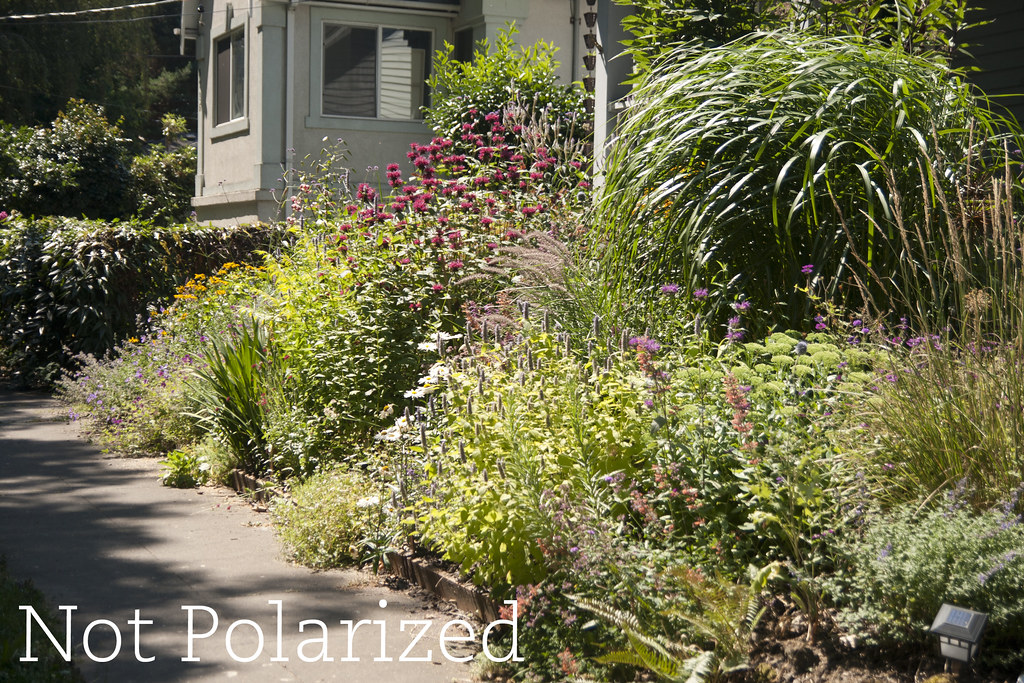
Here are two wider shots, showing both effects of the polarizer, both the reduction in visible glare (hot spots) and the saturation of colors that comes from minimizing the scattering effect of the glare.
The filter screws onto the front of your lens and you use it by turning it until you get the desired effect. Depending on the angle you are in relation to the sun, it could have a dramatic effect, or no effect at all...it takes a bit of getting used to the quirks, and it IS possible to go too far, but it's worth it for most shots to give it a try.
So, if you have a camera that accepts a polarizing filter, I say go for it! You can find them pretty cheap on Amazon (just make sure you get the right one for you size lens...usually you can see the size in Millimeters on the edge of the lens). They are useful more often than not, especially if shooting in wet conditions or if you are forced to shoot in full sun.

Okay-that solves ONE of my problems. Keep going!
ReplyDelete:)
Well it would be wonderful but afraid for me it's a long off purchase. :) Sure makes a nice difference though.
ReplyDeleteCher Sunray Gardens
I now know what I need, but it may require getting a new camera too. Thanks for the tip.
ReplyDeleteSee there you go, giving away all your secrets! Although now I know how Pam (digging) made my garden look so good!
ReplyDeleteGreat tip Scott and demonstrated so wonderfully.
ReplyDeleteI've found that reducing the glare can also be accomplished while editing the photos and since my camera is a point and shoot I can get a lot of glare. Great illustrations.
ReplyDeletenice tute.
ReplyDeleteDear Scott, I guess I need a better camera. But now I know what to do when I get one, P.
ReplyDeleteGreat information. Thanks, Scott.
ReplyDeleteI've been thinking of getting a polarizer for awhile now. Your photos were great at showing me how useful a little thing it is.
ReplyDeleteI have both a point and shoot and a multi-lens camera. I agree it makes a big difference but I hate lugging the big camera around. I wish they would invent something for the smaller cameras.
ReplyDeleteEileen
Will have to remember this useful snippet of information Scott. Hope to move on in camera terms in the future. Have enjoyed your recent posts but as usual the want list grows. It looks as if agastache 'Ava' and 'Blue Blazes' have not crossed the pond. I am distraught!
ReplyDeleteThanks for this informative post, Scott. I have just added to my wish list. I hope they have such a filter for my camera.
ReplyDeleteGreat to see it laid out so clearly.
ReplyDeleteI have a polarizing filter but don't use it because I'm never sure how or when. You make a pretty compelling case. Do you use it all the time or only in certain conditions or at certain times of day? Is there ever a time when you *wouldn't* want to use it?
ReplyDeleteAnd Loree, nope! I didn't use a polarizing filter when I shot your garden. But I did definitely shoot during the golden hour.
Excellent post. Thanks!
ReplyDeleteEnjoyed the lesson!
ReplyDeleteAnd I thought I was going to see examples of extremely different types of plant choices! This is a great tutorial...thanks, Scott!
ReplyDeleteSue: Hahahaha…indeed!
ReplyDeleteSunray Gardens: Yeah…one thing at a time :-)
Bluestem: Uh-oh…well, that's something to look forward too…I saved up for my camera forever…it was pretty torturous!
Danger Garden: Ha! Luckily, I have many more (and better) secrets stashed away somewhere…if I could only remember where I put them ;-)
Lona: Thanks!
Grace: Good point…some photo apps have a variety of filters to help improve images!
Greggo: Thanks!
Pam's English Garden: Glad to help…I do wonder if them make a version for point-and-shoot cameras…hmmm.
Zoey: Anytime!
LeavesnBloom: Go for it…and they don't have to be very expensive, I picked mine up for about $30 at a local photo store.
Gatsby Gardens: That's the truth…somedays I just leave my camera at home, I can't stand the thought of lugging it around…although I ALWAYS regret not having it later!
Anna; Oh no! I'll cross my fingers for you getting 'Ava' and 'Blue Blazes'…if the ease with which cuttings root in my garden are any indication, propagation isn't the problem…maybe there is a problem getting garden centers to pick them up? I'd email High Country Gardens if I was you…get the ball rolling!
Bom: I hope so…they are fairly inexpensive and so very helpful!
Kate: Thanks…I try ;-)
Pam/Digging: You know, it's kinda tricky knowing when to use it…so I just leave it on my one lens all the time! It works best if you are at certain angles in relation to the sun…not if it's directly overhead, behind or in front of you. The only time it's a detriment is in really low light, as it effectively cuts the amount of light reaching the sensor.
Hoover Boo: Glad you liked it!
Compost in my shoe: Yay!
MulchMaid: Hahahah…that's a good topic for a later post!
Great post! I used to really be into photography. I still have my old Pentax K1000 - 100% manual camera! I loved to mess with all the settings and filters to get the desired effects. Once digital cameras came out I thought I could forget all that I had learned. And I did. Your post led me to get out my old filters, if I can find an adapter for my new camera, I think I will be able to use them again. Thanks!
ReplyDeleteI wondered what your secret of your great photos was, Scott. Now I know. We're about to invest or maybe it's indulge in our first SLR digital camera. Add 1 polarizing filter. Very useful post. Thanks!
ReplyDelete